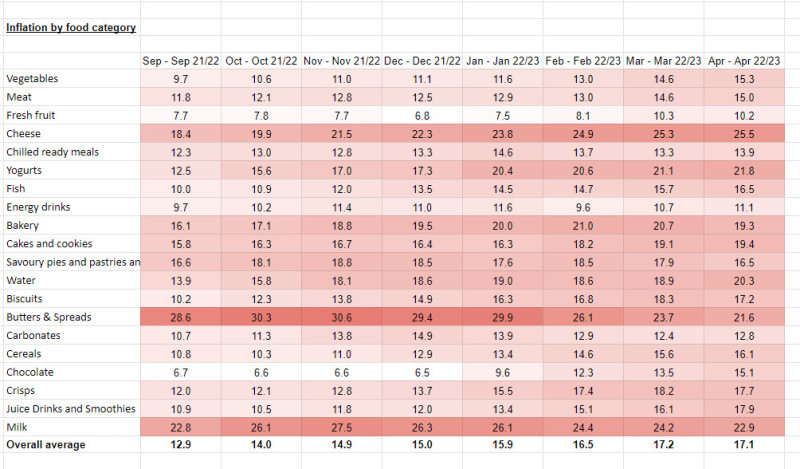Amid the growing calls to tackle soaring food prices, latest data released by consumer watchdog Which? confirms that the cost of many everyday foods is continuing to rise, with discounters recording some of the biggest rises.
The analysis of more than 26,000 products across the eight major supermarkets found that overall inflation had eased slightly, from 17.2% in March to 17.1% in the month to the end of April. Inflation cooled in categories that have previously seen the highest rises, including milk, butters and spreads and bakery items, while other essential food groups like meat, fish and vegetables have continued to rise month on month.
Which? highlighted that the price of some items had almost doubled compared to last year, including items such as onions, yoghurt, and frankfurters.

Meanwhile, the cost of supermarket own-label budget items was up 25% last month compared with the same time last year. Inflation in branded goods showed no change, staying at 13.8%, while regular own-label food and premium own-label food inflation decreased slightly since last month.

Looking at inflation rates by retailer, Which? found that while the discounters remain generally cheaper than the traditional supermarkets, they appear to have less room for flexibility when it comes to passing on higher costs to customers.

After publishing the data, Which? urged the Prime Minister to challenge supermarket chief executives to do more at today’s ‘Farm To Fork’ summit at No10. It said Rishi Sunak should ask them to take urgent action to help consumers cope with rampant food price increases by ensuring that smaller convenience stores stock a range of essential budget lines that support a healthy diet, especially in areas where they are most needed.
Which? stated that Sunak should also ask supermarkets to commit to clearer unit pricing, especially on promotions and loyalty card offers, so that people can more easily work out which products offer the best value.
NAM Implications:
- Whilst any easing of inflation is welcome…
- …it should be kept in mind that any reduction in inflation simply means that prices are rising more slowly.
- i.e. are not going down.
- Meanwhile, given that budget O/Ls are increasing more than branded equivalents…
- …and brand-leader premia over O/L equivalents are not rising…
- …it is probable that the brand-O/L battle will be fought in middle ground brand & O/L.
- P.S. Unit pricing, always a good idea, but even true like-with-like comparison still appears beyond the reach of shoppers in terms of application.



